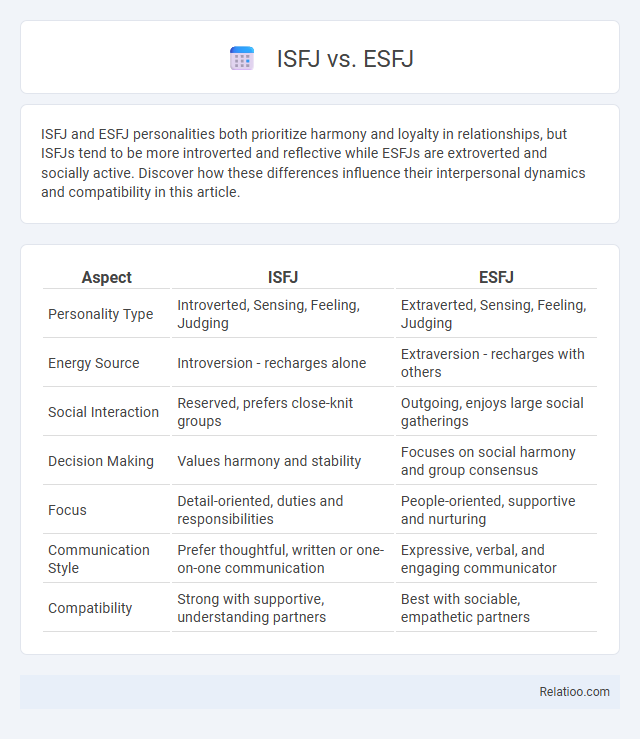ISFJ and ESFJ personalities both prioritize harmony and loyalty in relationships, but ISFJs tend to be more introverted and reflective while ESFJs are extroverted and socially active. Discover how these differences influence their interpersonal dynamics and compatibility in this article.
Table of Comparison
| Aspect | ISFJ | ESFJ |
|---|---|---|
| Personality Type | Introverted, Sensing, Feeling, Judging | Extraverted, Sensing, Feeling, Judging |
| Energy Source | Introversion - recharges alone | Extraversion - recharges with others |
| Social Interaction | Reserved, prefers close-knit groups | Outgoing, enjoys large social gatherings |
| Decision Making | Values harmony and stability | Focuses on social harmony and group consensus |
| Focus | Detail-oriented, duties and responsibilities | People-oriented, supportive and nurturing |
| Communication Style | Prefer thoughtful, written or one-on-one communication | Expressive, verbal, and engaging communicator |
| Compatibility | Strong with supportive, understanding partners | Best with sociable, empathetic partners |
Understanding ISFJ and ESFJ: Core Personality Traits
ISFJ and ESFJ personality types share a strong focus on nurturing and loyalty, grounded in the Myers-Briggs Type Indicator (MBTI) framework. ISFJs tend to be introverted, detail-oriented, and deeply committed to personal values, often thriving in quiet, structured environments. ESFJs exhibit extroverted traits, prioritizing social harmony and actively engaging in community or group activities, making them adept at managing interpersonal relationships and reactions.
Key Similarities Between ISFJ and ESFJ Types
ISFJ and ESFJ personality types share a strong focus on harmony, reliability, and a commitment to helping others, making their reactions empathetic and supportive. Both types prioritize maintaining social order and demonstrate consistent sensitivity to the needs and emotions of those around them. Your interactions with ISFJ or ESFJ individuals often reflect their shared dedication to nurturing relationships and providing dependable emotional support.
Major Differences: ISFJ vs ESFJ Explained
ISFJs and ESFJs both prioritize harmony and are highly empathetic, but ISFJs are more introverted, focusing inwardly on personal values and detailed memory recall, while ESFJs are extroverted, seeking social interaction and external validation. ISFJs rely heavily on sensing and judging functions to support structured, methodical approaches to tasks, whereas ESFJs emphasize emotional responsiveness and collaboration to maintain group cohesion. The major difference lies in ISFJ's inward reflection and reserved nature compared to ESFJ's outward social engagement and expressiveness.
Communication Styles: ISFJ vs ESFJ
ISFJs communicate with a calm, thoughtful style, prioritizing listening and offering supportive, detailed responses that respect others' feelings and privacy. ESFJs express themselves energetically and openly, often using expressive gestures and seeking immediate social harmony through direct, enthusiastic interaction. Their differing approaches influence reactions: ISFJs may respond cautiously and reservedly, while ESFJs tend to react quickly and socially, aiming to maintain group cohesion.
Approach to Relationships and Social Interactions
ISFJs approach relationships with deep loyalty and a preference for intimate, one-on-one connections, valuing stability and long-term commitment. ESFJs prioritize social harmony and are highly attuned to others' emotions, often taking an active role in nurturing group cohesion and community involvement. Their reactions to social situations tend to be empathetic and responsive, with ESFJs showing more outward expressiveness and ISFJs demonstrating quiet supportiveness.
Work Habits and Career Preferences
ISFJs prefer structured, detail-oriented work environments that allow them to focus on helping others through consistent routines, making them excel in roles like healthcare or administrative support. ESFJs thrive in collaborative and social settings, using their strong interpersonal skills to manage teams or coordinate events, often favoring careers in teaching, sales, or customer service. Your reaction to workplace challenges might differ as ISFJs tend to approach problems methodically and quietly, while ESFJs respond with active communication and seek immediate group consensus.
Common Strengths and Weaknesses
ISFJ and ESFJ personality types share common strengths like strong empathy, reliability, and dedication to helping others, making them excellent team players and caregivers. Both types excel in creating harmonious environments but may struggle with resistance to change and difficulty asserting personal needs. Reaction to stress often differs; ISFJs tend to internalize emotions, while ESFJs might express feelings more openly, impacting conflict resolution styles.
Conflict Resolution Styles
ISFJ individuals approach conflict with a calm and empathetic style, prioritizing harmony and often avoiding confrontation to maintain relationships. ESFJ personalities tend to address conflicts directly but diplomatically, seeking consensus and emphasizing cooperative solutions that consider everyone's needs. Your ability to navigate conflict can be enhanced by recognizing ISFJ's preference for quiet understanding and ESFJ's proactive engagement, allowing you to tailor your responses to create effective resolutions.
Growth Opportunities for ISFJ and ESFJ
ISFJs and ESFJs excel in nurturing relationships but differ in their approach to reaction and growth opportunities. ISFJs benefit from developing assertiveness and embracing change to enhance their adaptability, while ESFJs grow by managing emotional responses and prioritizing self-care to maintain balance. Your focus on strengthening these areas can lead to improved emotional resilience and interpersonal effectiveness.
Choosing the Right Path: ISFJ or ESFJ?
Choosing the right path between ISFJ and ESFJ depends on your preference for introverted reflection versus extroverted interaction, as ISFJs excel in thoughtful support and detailed-oriented care while ESFJs thrive in social engagement and group harmony. Recognizing your reaction to social stimuli and decision-making style helps determine which personality aligns better with your lifestyle and goals. Understanding these differences ensures your personal growth follows a path suited to your natural tendencies and emotional responses.

Infographic: ISFJ vs ESFJ
 relatioo.com
relatioo.com